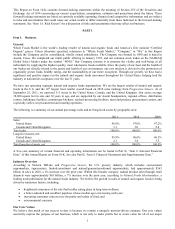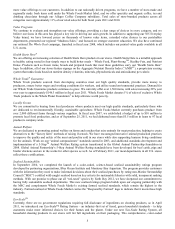Whole Foods 2011 Annual Report Download - page 19
Download and view the complete annual report
Please find page 19 of the 2011 Whole Foods annual report below. You can navigate through the pages in the report by either clicking on the pages listed below, or by using the keyword search tool below to find specific information within the annual report. 13
We may experience fluctuations in our quarterly results of operations, which may adversely affect our stock price.
Our quarterly operating results and quarter-to-quarter comparisons could fluctuate for many reasons, including, but not
limited to, variations in the mix of product sales, price changes in response to competitive factors, seasonality, increases in
store operating costs, including commodity costs, possible supply shortages, general economic conditions, extreme weather-
related disruptions, and other business costs. In addition, our results may be impacted by the timing of new store openings,
construction and pre-opening expenses, the timing of acquisitions, store closures and relocations, and the range of operating
results generated from newly opened stores.
Our stock price has been volatile and may be negatively affected by reasons unrelated to our operating performance.
In fiscal year 2011, the closing market price per share of our common stock ranged from $34.57 to $72.10. The market price
of our common stock could be subject to significant fluctuation in response to various market factors and events. These
market factors and events include variations in our sales and earnings results and any failure to meet market expectations;
changes in ratings and earnings estimates by securities analysts; publicity regarding us, our competitors, or the natural
products industry generally; new statutes or regulations or changes in the interpretation of existing statutes or regulations
affecting the natural products industry specifically; and sales of substantial amounts of common stock in the public market or
the perception that such sales could occur and other factors. In addition, the stock market, at times, experiences broad price
fluctuations that may adversely affect the market price of our common stock.
Adverse publicity may reduce our brand value and negatively impact our business.
We believe our Company has built an excellent reputation as a food retailer, socially responsible corporation and employer.
We believe our continued success depends on our ability to preserve, grow and leverage the value of our brand. Brand value
is based in large part on perceptions of subjective qualities, and even isolated incidents can erode trust and confidence,
particularly if they result in adverse publicity, governmental investigations or litigation, which can have an adverse impact on
these perceptions and lead to adverse affects on our business or team members.
Changes in the availability of quality natural and organic products could impact our business.
There is no assurance that quality natural and organic products will be available to meet our needs. If other supermarkets
significantly increase their natural and organic product offerings, if new laws require the reformulation of certain products to
meet tougher standards, or if natural disasters or other catastrophic events occur, the supply of these products may be
constrained.
Disruption of significant supplier relationships could negatively affect our business.
United Natural Foods, Inc. is our single largest third-party supplier, accounting for approximately 31% of our total purchases
in fiscal year 2011. During fiscal year 2010, we extended our long-term relationship with UNFI as our primary supplier of
dry grocery and frozen food products through 2020 and added two of our regions to our distribution arrangement beginning
in fiscal year 2011. Due to this concentration of purchases from a single third-party supplier, the cancellation of our
distribution arrangement or the disruption, delay or inability of UNFI to deliver product to our stores may materially and
adversely affect our operating results while we establish alternative distribution channels.
Future events could result in impairment of long-lived assets, which may result in charges that adversely affect our results of
operations and capitalization.
Our total assets included long-lived assets totaling approximately $2.06 billion at September 25, 2011. Long-lived assets are
evaluated for impairment whenever events or changes in circumstances indicate that the carrying amount of an asset may not
be recoverable. Our impairment evaluations require use of financial estimates of future cash flows. Application of alternative
assumptions could produce significantly different results. We may be required to recognize impairments of long-lived assets
based on future economic factors such as unfavorable changes in estimated future undiscounted cash flows of an asset group.
We have significant lease obligations, which may require us to continue paying rent for store locations that we no longer
operate.
The majority of our stores, distribution centers, bakehouses and administrative facilities are leased. We are subject to risks
associated with our current and future real estate leases. Our costs could increase because of changes in the real estate
markets and supply or demand for real estate sites. We generally cannot cancel our leases, so if we decide to close a location,
we may nonetheless be committed to perform our obligations under the applicable lease including paying the base rent for
the remaining lease term. As each lease expires, we may fail to negotiate renewals, either on commercially acceptable terms
or any terms at all. As of September 25, 2011, we had 20 leased properties that are not being utilized in current operations.
These properties represent acquired dormant locations, stores closed post-acquisition, and stores closed due to relocation.
























